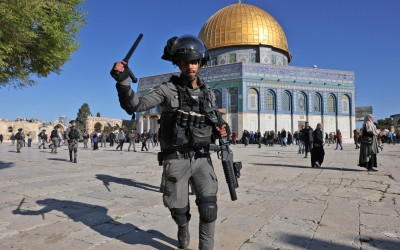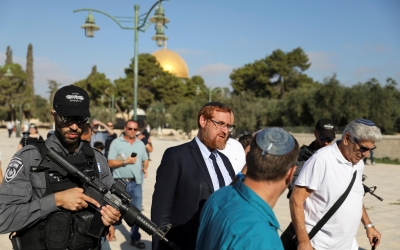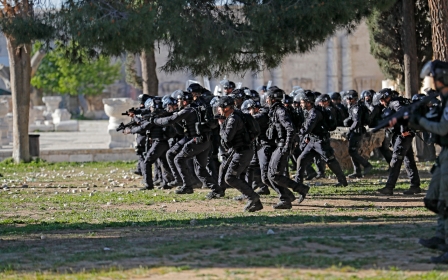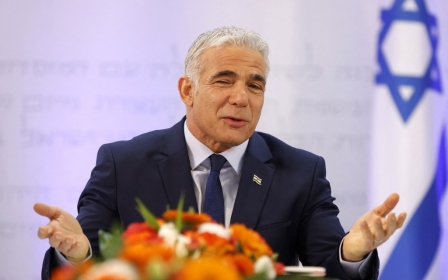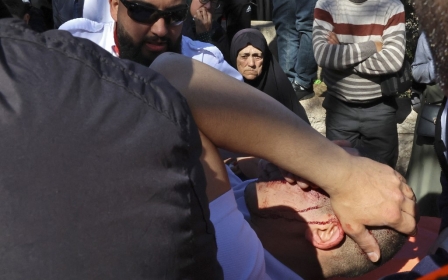Israel's al-Aqsa aggression risks an intifada it would be unable to contain
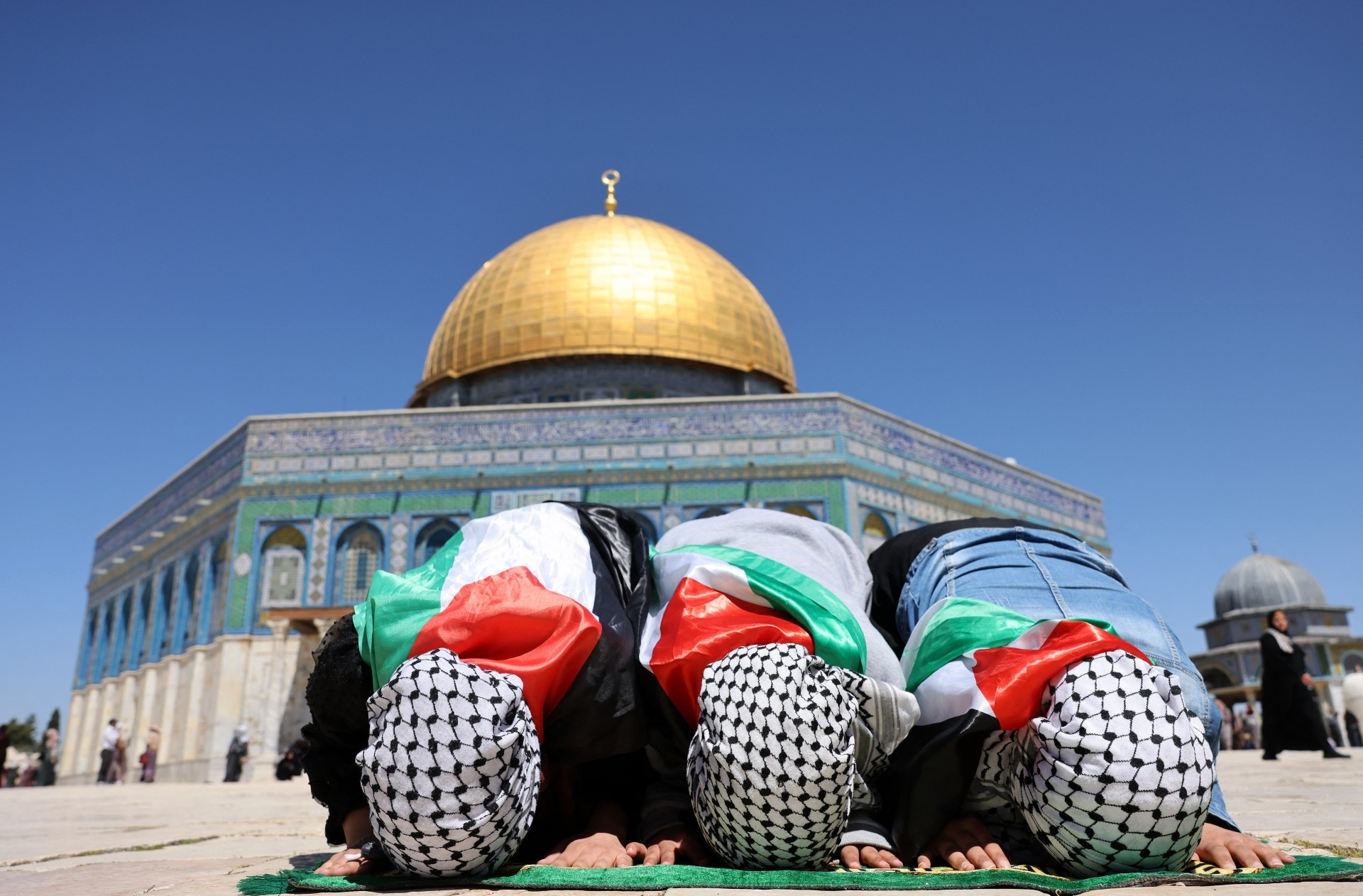
Since the Second Intifada began to wind down early in 2005, every few months or years we hear that a Third Intifada has begun or is about to.
There was the "lone wolf intifada" (also called the "knife intifada") in 2015, featuring actions by individual Palestinians and targeting mainly Israeli soldiers and settlers; the massive March of Return in 2018 when Gaza residents walked together toward the fence that cages them inside the Strip; the civil disturbances of May 2021 that began with escalating violence in East Jerusalem and spread to Gaza and mixed Jewish-Palestinian cities within Israel.
All that activity did indeed signal increasing violence and lethality in the simmering conflict but, ultimately, did not end in a general Palestinian uprising comparable to the First and Second Intifadas.
Caution is certainly merited before declaring that we are on the verge of a Third Intifada
Thus caution is certainly merited before declaring that we are on the verge of a Third Intifada.
Yes, clearly there are elements reminiscent of earlier uprisings: a series of attacks by Palestinians within the Green Line; intensive Israeli military operations in the West Bank, mainly in its northern areas; more than 10 Israelis killed, nearly all civilians, and more than 15 Palestinians shot dead, nearly all civilians not involved in fighting.
New MEE newsletter: Jerusalem Dispatch
Sign up to get the latest insights and analysis on Israel-Palestine, alongside Turkey Unpacked and other MEE newsletters
Meanwhile, there are broader-than-usual hostilities in West Bank cities; protests at al-Aqsa and the incursion by Israeli police into the mosque's prayer hall itself.
Discussions of a new intifada generally focus on the situation in the West Bank, Gaza Strip and East Jerusalem. This is the right perspective, because intifadas are first and foremost a Palestinian response to the occupation. Meanwhile, however, a look at the Israeli side is also worthwhile; the Israeli side is in a very problematical situation, politically.
Israeli paralysis
The First Intifada broke out when Israel had a so-called national unity government of Likud and the Labor Party. Yitzhak Shamir of Likud was prime minister, and Yitzhak Rabin of Labor was defence minister. National unity governments are generally a prescription for paralysis, since they rely on the notion that what is important is that Jews from the right and the left be in agreement, by virtue of avoiding "political" matters like the occupation and the settlements.
The Bennett-Lapid-Gantz government is in this sense reminiscent of Shamir and Rabin's. Prime Minister Naftali Bennett set the tone when he declared a short while after taking office that there would be "no diplomatic process with the Palestinians".
Yair Lapid adopted this logic fully when he declared that, on rotating into the prime minister's job, he too would refrain from any such diplomatic process. What remains, then, is to maintain the occupation, as overseen by Defence Minister Benny Gantz, who has relegated the Palestinian Authority and Palestinian President Mahmoud Abbas to a sub-department of Palestinian affairs in his ministry.
But while the Shamir-Rabin government was built on a balance between "the right" and "the left," the situation in the Bennett-Lapid government is oddly different. The coalition has a clear centre-left majority, and even includes an Arab-Islamic party for the first time in Israel's history, yet the government is headed by an extreme rightist and most of the more sensitive ministries, such as justice and interior, are also led by figures who are decidedly right wing.
That's not all. The parliamentary opposition to this government is very large and can no longer be termed "rightist" in the sense Israelis are accustomed to. This right-wing opposition sanctifies Jewish supremacy and the primacy of a "Jewish state" over "a state of all its citizens," that is, over democracy.
Former prime minister Benjamin Netanyahu is the official leader of this right wing, but its most prominent figures are Bezalel Smotrich, who heads the Religious Zionist Party and has explicitly declared that Arabs are not entitled to be part of the government or even to sit in parliament, and Itamar Ben-Gvir, who was convicted in the past of right-wing terrorist activity and belonged to a movement calling for the expulsion of Palestinians from the territories under Israel's control.
These right-wing parties currently hold more than 50 seats in parliament (out of the 120 in Israel's legislature), and public opinion polls give right-wing parties nearly 50 percent in a new election.
Thus we find ourselves in a situation in which the far right is both inside the government and outside of it, while there is no real balance in the government itself. The Zionist "left" parties - Meretz and Labor - relinquished at the outset any attempt to influence the government's political platform.
Centrist party leaders Yair Lapid of Yesh Atid and Benny Gantz of Blue and White are standing on the sidelines, and Mansour Abbas, who heads Raam, the conservative Islamic party that joined the coalition, has completely adopted - at least prior to the police raid on al-Aqsa on Friday - the Bennett-esque philosophy that "we will not be discussing the conflict".
Pressure from the right
To this we must add the accelerating fusion of the military and the settlers, certainly the army serving in the West Bank and reinforcing the occupation on a daily basis.
Elsewhere, operational cooperation has been revealed between Israeli army units and armed settlers who attack Palestinian civilians, functioning as a type of joint vigilante militia of soldiers and settlers. We have seen something similar in the way the army has assisted with settler projects like the establishment of the illegal outpost of Itamar on village lands belonging to Beita in the northern West Bank, and the reestablishment of Homesh, a settlement dismantled in 2005 and lately re-erected on village lands north of Nablus.
An even clearer example occurred in Nablus last week. An Israeli army force was dispatched to provide security during repairs to the structure at Joseph's Tomb, which is in an area ostensibly under full Palestinian control and revered by Jews as the resting place of the biblical Joseph.
Shomron regional brigade commander Colonel Roi Zwieg described the operation in messianic religious terms. At the site, Zwieg told soldiers before they deployed that "this land was promised to our forefather Abraham and that we, as soldiers of the Israeli army, operate there now not as thieves in the night but as descendants of kings. It is thus our privilege to restore honour to the land and the people of Israel."
Minister of Religious Services Matan Kahana, a member of Bennett's own Yamina party supposedly representing the "moderate" right wing in the government, quoted Zwieg's statement and added (as per God's biblical promise to Abraham): "To your descendants will I give this land."
In other words, the extent of flexibility in the current Israeli government is nil. It announced in advance that it would not address the "political issue" and has no real channels of communication with the Palestinians, the messianic right is pressuring it from without and from within, while the Israeli army, at least the part of it serving in the West Bank, has itself become an arm of the right, adopting the oppression of the Palestinians there as almost a religious mission.
This is also evident in what is taking place at al-Aqsa Mosque in Jerusalem. Although the internal security minister, who oversees the police, is Omer Bar Lev, a Labor Party figure known for his dovish views, he appears unable to prevent extremist Jewish figures from entering the al-Aqsa courtyards or to prevent police from violently engaging with Muslim worshippers there.
It is hard to know at present how far these developments may have already progressed. After the police incursion into the al-Aqsa Mosque's Qibli prayer hall itself, Mansour Abbas's Raam party announced a "suspension" of its participation in the coalition.
The importance of this "suspension" is unclear, but it obviously serves to further weaken the government, which sustained a body blow 10 days ago when one of the key legislators from Bennett's own party withdrew from the coalition, leaving it without a parliamentary majority.
If Abbas's party also quits the coalition in response to anger among Muslims in Israel over what has been happening at al-Aqsa, the government's survival would appear doubtful.
This means that if the Palestinian public were to enlist in a broad uprising - which is as yet hard to predict, as is the nature that any such new uprising might adopt, whether closer to the popular movement characterising the First Intifada in 1987 or the more military nature of the Second Intifada in 2000 - it would be confronting an Israeli government in a situation of almost complete paralysis.
With little room to manoeuvre with the Israeli public or with the various components of its coalition, the Israeli government would have almost no ability whatsoever to dialogue with the Palestinian leadership (on the assumption that there is a Palestinian leadership that enjoys any credit among its own constituency), and would have negligible ability to enlist international mediators to help resolve the crisis.
It is hard to see who in today's Israel would be able to apply the brakes. This is certainly a potential recipe for progressively unfolding violence, and hence perhaps for another Intifada.
This article is available in French on Middle East Eye French edition.
Middle East Eye delivers independent and unrivalled coverage and analysis of the Middle East, North Africa and beyond. To learn more about republishing this content and the associated fees, please fill out this form. More about MEE can be found here.


